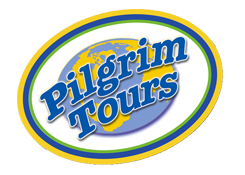

Click on the tabs for more information
Price Per person double occupancy
| Dates |
|---|
| Request a quote or call 800-322-0788 for more information. |
|
Ask About Special Rates for Pastors, Christian Educators, & Custom Groups of All Sizes. No Obligation Group Quotation - Click Here |
Click here for "Frequently Asked Questions"
Category Prices - Cruise Ship Info
Shore Excursions - Click Here
Price Includes: Inside cabin (category D), first class (4 Star) lodging, breakfast and dinner daily, modern transportation, sightseeing as listed.
Not Included: Flight departures (low cost fares available nationwide), travel/cancellation insurance, optional port tours, gratuities, port taxes ($136.00), Turkey visa fee (U.S. $30.00 / Canada $60.00 USD) See information below.
Please Note: Turkey Entry Visas* must be secured in advance prior to arrival. Visas can be obtained in advance online at the link below. Optional shore excursions can be purchased on tour prior to cruise embarkation.
*Turkey “E-Visa” online purchase - Click Here
Airport transfers are included only when airfare is purchased from Pilgrim Tours. Taxi service is available for those purchasing their airfare elsewhere.
Day 1: Departure from US
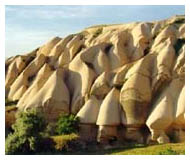
Today we embark on our journey to the lands of ancient treasures and Christian history with an overnight flight to Turkey. Prepare yourself for a life-changing experience. Get some rest on the flight…Tomorrow you will be walking where the apostles walked!
Day 2: Arrive Turkey, Cappadocia
Arriving in Kayseri, we transfer to our lodging for the next two evenings, where the remainder of the day is free for you to relax and enjoy a leisurely dinner.
Day 3: Cappadocia
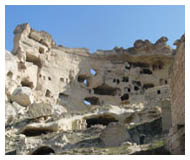
We spend all day exploring the history and scenery of Cappadocia. First off, we’ll visit the gently folding volcanic rock formations and “fairy chimneys” of Goreme Open Air Museum. These rock formations are not only beautiful, but functional as well. Many early Christian communities lived and worshipped deep in the rocks and crags, leaving their frescoes and paintings to be marveled at centuries later. Other communities lived underground, and we’ll visit these dwellings too. To protect themselves from Roman persecution and marauding bandits, local people began to live in underground caves forming “cities” that reach a depth of up to 7 stories below the surface. Other sites include the Natural Citadel of Uchisar and the small, picturesque village of Avanos – famous for their red clay pottery. In Avanos we’ll visit “The Potter’s Place: Gift Shoppe and Cultural Center” and have time for visiting local potter for a demonstration and maybe try your own hand at the potter’s wheel.
Day 4: Cappadocia / Caravanserai / Lystra / Konya
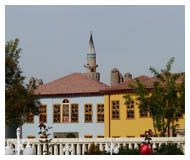
Travelling westward, we stop at the Sultanhani Caravanserai just like travelers from Turkey’s bygone era. Founded for military and trade purposes, the Caravanserai’s Inn was built along the east-west trade route. We will have lunch near Konya, followed by an afternoon visit to Lystra, where Paul preached on his first missionary journey (Acts 14: 6-22). Our lodging this evening will be in Konya (ancient Iconium) included in Paul's first missionary journey. Nearly two thousand years ago, Paul and Barnabas visited Iconium during Paul’s first missionary journey. As he preached to the city, God used Paul to bring many Jews and Gentiles to Christ (Acts 14: 1-6). We will also visit the excavations of Catalhoyuk before transferring to our lodging for the evening in Konya.
Day 5: Pisidian Antioch / Mevlana Mausoleum
Konya is also the home of the Mystic sect of the spectral Whirling Dervishes. We’ll have an opportunity to learn more about this mysterious order when we visit the museum of its founder, Mevlana, who is also known as the poet Rumi. We will continue to Pisidian Antioch – one of important stops on Paul’s missionary journeys. Although only 10% of Pisidian Antioch has been excavated, the ruins from the Roman period are noteworthy. We’ll see Septimus Severus’ triumphal gate, Augustus’ Temple, the Roman baths, a theater and a church dedicated to Paul. We transfer to the airport for our flight to Istanbul and our lodging for the next two evenings.
Day 6: Bustling Istanbul
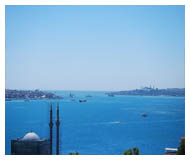
The tour today will be an unusual combination of Greek Orthodox, Roman, Ottoman and modern day Islam including entrance into the famed Blue Mosque and St. Sophia Church. After lunch we visit the fascinating Topkapi Palace housing the many priceless treasures and colorful stories of Ottoman Sultans. We return to our hotel for dinner and overnight.
Day 7: Archaeological Museum, Sea of Marmara
This morning our guide will walk us through the wonderful exhibits at the Archaeological Museum. Treasures include the sarcophagus of Alexander the Great, mosaic remnants depicting the times of Nebuchadnezzar, tablets of the Treaty of Kadesh known to be between Ramses II and the Hittites during the 13th century BC and many other wonderful items. Departing Istanbul, we travel west across "Trace," the European portion of Turkey. The summer homes along the Sea of Marmara will provide the scenery as we travel. Views of the bunkers on the hillside and the ocean going vessels give clear understanding to the commentary of the British major losses and World War I defeat in the Dardanelles Strait. Our bus boards a large ferry for the scenic crossing of the Dardanelles to our lodging this evening in picturesque Çanakkale.
Day 8: Ancient Troy, Pergamum & Izmir
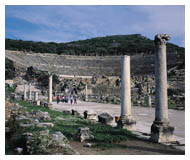
We pass by the area known as Troas, where Paul had a vision during his second missionary journey and was called to Macedonia (Acts 16:8-13). Paul later spent a week in Troas preaching here and Eutychus was resurrected (Acts 20:6-12). Ancient Troy is well known for its 3rd and 4th Century BC excavations. Don't forget to have your picture taken from the top of the Trojan Horse. Our next visit of the day is Pergamum. Once a busy trading center and famous as a "seller of purple," the most favored of the Seven Churches, the church of Pergamum was praised for its forbearance (Rev. 2:12-17). It was here that the first Christians were executed by Rome. We'll visit the fabled Acropolis, pass through the Royal Gates, view the foundations of the Temple of Zeus and visit the ruins of the library, which once held 200,000 volumes. We continue south to Izmir the third largest city in Turkey and a long time center for Jews and Christians. In Paul's day, Izmir was known as Smyrna and was another of the Seven Churches (Rev. 2:8-11). Here we'll see Polycarp's Church and the ancient agora. Our lodging this evening will be in Izmir.
Day 9: Thyatira, Sardis, Philadelphia, Pamukkale
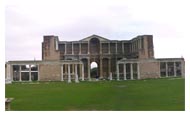
A stop will be made in Thyatira to view the ancient roadway and period columns en-route to Sardis. Sardis was berated by John for its facade of strength when in reality, it was weak (Rev. 3:1-6). Here coins were minted and the dyeing of wool originated. We'll visit the gymnasium and synagogue. Our next stop is nearby Philadelphia which was referred to as the "New Jerusalem" (Rev. 3:7-13) in the Book of Revelation. Not much is left of the city except for the ancient wall and the remains of a Byzantine basilica in the modern city of Alasehir. Our lodging this evening will be in a lovely spa hotel in Pamukkale.
Day 10: Hierapolis, Laodicea & Colossae
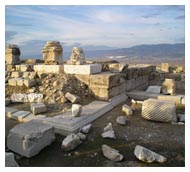
Hierapolis, meaning "Sacred City," was an ancient center for pagan cults until it was transformed into a Christian center in the first century. According to tradition, the Apostle Philip lived and was martyred in Hierapolis. It was likely the hot springs of Hierapolis in contrast to the cold mountain springs near Colossae that combined to bring application to the "luke warm" Laodiceans (Rev 3:14-22). This connection between the cities lies behind Paul’s reference to Hierapolis and Laodicea in his epistle to the Colossians (Col 4:13). Laodicea contains many acres of ruins to visit including a stadium and remnants of a sophisticated water system. Nearby Colossae is well-known throughout Christian circles as the receiver of Paul's letter to the Colossians. Today, the town has fallen into obscurity and nothing remains. We spend the remainder of the day traveling through the Turkish countryside arriving in the port city of Kusadasi where we spend two nights. The day will not be complete without a visit to a local Turkish Rug cooperative.
Day 11: Ephesus
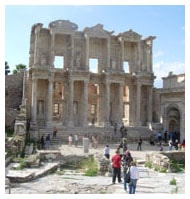
We travel to the nearby town of Selcuk for a visit to the Basilica of St. John, housing an immersion baptismal and believed to be resting place of John. From here we have an excellent overview of the Ephesus harbor and the Temple of Artemis, completed in its most famous phase around 550 BC and listed as one of the Seven Wonders of the Ancient World. Next, we travel a short distance down the hill to visit the Mosque of Jesus (Jesus is a respected prophet to Muslims). We spend the remainder of our day in Ephesus, the city of the Bible and one of the largest restorations still in progress with miles of ancient treasures. Ephesus was once a thriving port town of 250,000 people. Today you can still see the spectacular excavations of the major streets in this ancient city where we view the Library, Agora, Temple of Artemis, theatre, colorful mosaics, a panoramic view of the surrounding ancient port area including a wealth of church history and cultural insight.
Day 12: Isle of Patmos
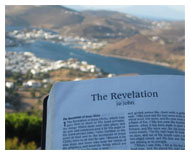
This afternoon we embark our cruise ship and sail for a visit to the beautiful Isle of Patmos, under statutory protection as a historic monument. Here we have a optional tour to see the fortified monastery of St. John and the cave claimed to be where John received the Revelation. Back on the ship, enjoy dinner before settling in to your cabin for the night.
Day 13: Rhodes
After breakfast we will visit Rhodes. You may chose an optional tour to Lindos where we will see the medieval walls built by the Knights of St. John and the Acropolis. View St. Paul’s Bay where the apostle anchored on one of his voyages. Continue with a walking tour of the city of Rhodes which will include the ancient ruins and the Palace of the Knights. Again we return to the ship for dinner.
Day 14: Crete and Santorini
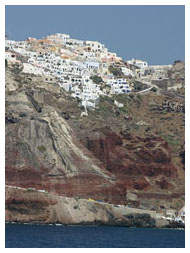
Crete is the largest and the most rugged of the Greek islands. Take an optional tour to Heraklion and the fantastic ruins of the Palace of Knossos. Discovered in 1899 and partially reconstructed, the elaborate Palace is believed to be the mythical Labyrinth of King Minos and the seat of ancient Minoan culture. This afternoon visit the island of Santorini which is perhaps the most breathtaking of all the Greek Islands. The town of Thira where white-washed houses, narrow streets, open-air cafes and glittering boutiques cling to steep cliffs, is accessible by foot path, cable-car or mule. You may choose to take an optional tour of sailing around an active volcano crater and swimming in the water heated by hot springs or enjoy this lovely island on foot. Again we return to the ship for dinner and evening entertainment.
Day 15: Disembark Cruise – Athens
We disembark the cruise this morning and travel into Athens, the foundation of democracy. We visit the Acropolis, the Parthenon, and Erectheum before viewing Athens atop Mars Hill where Paul stood and preached the truth to the Gentile nation. Additional sites include the Agora (ancient market place and center of Athenian public life), the House of Parliament, the Tomb of the Unknown Soldier, Olympic Stadium, and Presidential Palace. A short walk from your hotel is the famous Plaka with a multitude of shops and cafes. Our lodging is in Athens for the next two evenings.
Day 16: Corinth & Mycenae

Departing Athens, we stop for a rest stop and photos at the Corinth Canal and then travel to the ancient city of Corinth, another treat for the New Testament scholar. Corinth is the city that inspired many of Paul's most familiar letters. See the Archaeological Museum, the Market Place, the Bema, and the Temples. To enjoy a devotional in the midst of the ruins of the church of Corinth and see the pillars, steps, and public worship place where Paul preached will enhance your understanding and love of I & II Corinthians. The ruins of this important cultural center are fascinating as we walk along the stone path that the Apostle Paul walked. The engineering skill and intellect of these people are evident in the water systems that still flow from ancient to modern day. Our guide will be sure to show you the room dedicated to the medical care of that period. After the visit to ancient Corinth we travel to Mycenae where the remains of the ancient city date back to the Bronze Age to see the famous Lionesse Gate, the Tomb of Agamennon in the shape of a Beehive, and many other sites before continuing back to Athens.
Day 17: Meteora Monastery
From Athens, our tour travels northward past Thermopylae where we learn of the famous Spartan battle of 300. We continue through the mountains to Meteroa. Here we see the world famous Byzantine monasteries that are perched precariously on summits of gray rock pinnacles of varied and beautiful shapes. Their history goes back to the 14th century when the monks sought refuge in the cliffside caves then fled higher to build the original wooden shelters, later transformed into monasteries. Our lodging this evening will be in Meteora.
Day 18: Vergina, Berea, Thessalonica
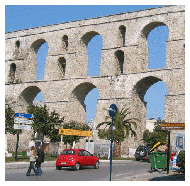
Traveling northward into Macedonia we visit King Phillip's (Alexander's father) tomb in Vergina, one of the most outstanding finds in all of Greece. A stop will be made in Berea to view the ancient synagogue where Paul spoke and the Bema surrounded by mosaics of Paul and the plaque of scripture regarding the "more noble" church. The New Testament books of I & II Thessalonians will come alive to us today as we arrive in the delightful harbor city of Thessalonica. En route to the hotel we will view the old city ramparts; the newly excavated Forum, St. George Church, an ancient Roman monument which was transformed into a church and the Galerius Arch which rises over the famous Via Egnatia. We spend two nights here.
Day 19: Thessalonica/Philippi/Kavala
We begin the day by following the massive battlement Byzantine wall to the citadel for a panoramic view of the city. Next, we will visit Philippi and Kavala. Kavala is Greece's prettiest mainland port with a most elegant harbor. Paul landed here with his disciples, Timothy and Silas. Luke, the Evangelist, also came here from Troas. This ancient city of Neapolis was later renamed Christoupolis because it was the first European city to accept Christianity. Imagine walking on the same sod as these men of the Bible! We will see the Roman Aqueduct and the ruins of the Acropolis in this beautifully located city, known since the 5th century as Kavala. Continue on to Philippi where Paul preached his first evangelical sermon and baptized the first Christians on European soil. We will view the baptismal site where Lydia surrendered her life to Christ and visit a crypt dating from the Roman period that is thought to have served as a prison for Paul. See the famous Acropolis, the Market Place, Basilica, and the Theatre. We return to Thessalonica and visit St. Demetrius Basilica, dedicated to a distinguished member of the Roman army and a martyred Christian convert, before returning to the hotel for our final night.
Day 20: Homeward Bound
We transfer to the airport for our flight back to the USA.
*The tour itinerary is subject to change or be slightly modified in order to best meet the interests of the group.

